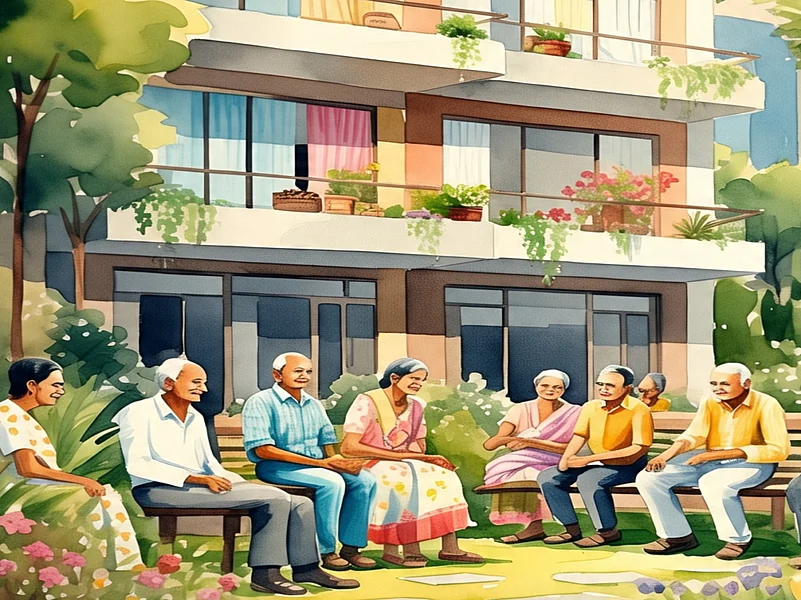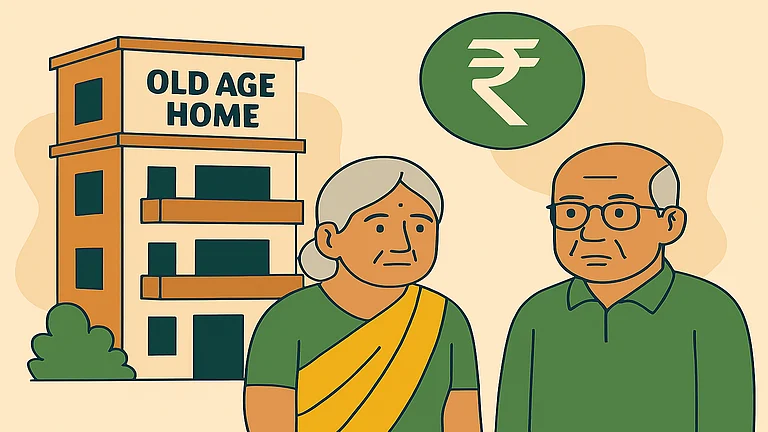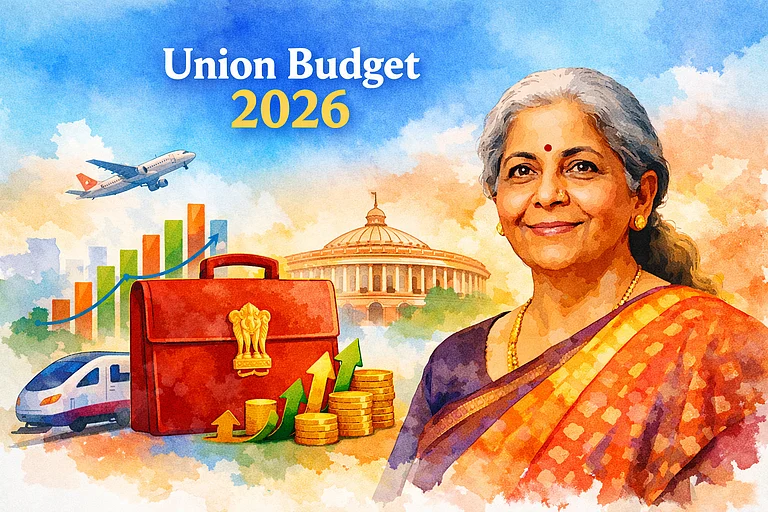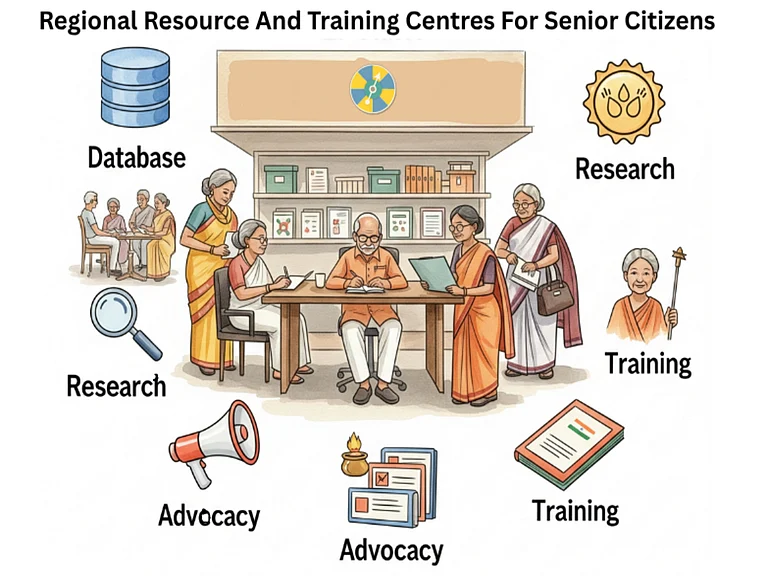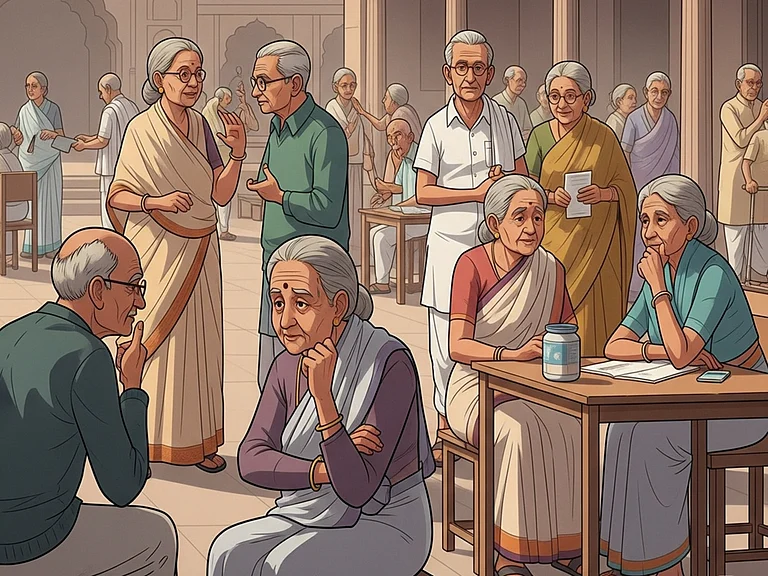By Rajit Mehta
India's social and demographic reality is undergoing a silent yet significant change that demands urgent attention while presenting bold new opportunities. The joint family system that once provided natural support networks for ageing parents is dissolving rapidly. Today, nearly one in four seniors lives alone or only with a spouse, while their children pursue careers in distant cities or countries, 78 per cent receive no formal pension with 70 per cent being financially dependent on their children or relatives, posing significant challenges for seniors and their families, both.
Consider The Reality Facing Millions Of Indian Seniors
A 70-year-old retired professional living in a beautiful home, financially secure but recognizing that ageing in isolation isn't sustainable. When the household help doesn't arrive, when the neighbourhood doctor is no longer available, when a medical emergency strikes at night, or when simple loneliness becomes overwhelming, these moments reveal why smart seniors are seeking comprehensive solutions.
Progressive families caring for ageing parents while managing their own careers and children are driving demand for better solutions. The traditional expectation that families can provide round-the-clock care no longer aligns with the reality of modern life: nuclear families, working women, geographic dispersion, and the complex medical needs of an ageing population.
These realities create both urgency and tremendous market opportunity as the number of India's seniors is projected to more than double from approximately 157 million today to around 350 million by 2050, when every one in four persons would be above 60 years. Yet, according to the latest JLL-ASLI report ‘Elevating the Golden Years’, our current senior living infrastructure serves less than 1.3 per cent of this population, compared to over 6 per cent in the United States.
This Shift Represents A Generational Opportunity To Build Comprehensive Solutions
Senior living communities that provide integrated housing and healthcare, assisted living facilities for those that need more active support, transforming senior care, supported by comprehensive insurance products or other financial solutions, government policies, robust regulations, and industry standardization. The challenge extends beyond building facilities to creating an entire ecosystem that enables dignified ageing.
Beyond Housing Towards Holistic Well-being
The data on isolation, depression and mental wellbeing reveals why discerning seniors are actively seeking community-based solutions, even when living with family. One in every three seniors in India experiences depression, and 33 per cent of older adults globally experience loneliness, with social isolation linked to a 50 per cent increased risk of dementia. Research also shows 8 per cent of Indian seniors have undiagnosed depression. There is growing demand for dignified living with support, but without institutionalisation.
Holistic wellbeing is at the core of solutions provided by senior living communities. These aren't just residences, they're environments designed for changing bodies and minds. Ageing friendly housing offers physical safety through step-free pathways, anti-skid flooring, gentle lighting designed for ageing eyes, emergency response systems that get help in minutes. Whereas community interaction becomes medicine through group yoga sessions, shared meals, bridge games, and neighbours checking on each other. Social participation is known to reduce dementia risk by 30-50 per cent, higher social activity delays dementia onset by five years. Seniors in well-designed communities are known to have lower hospital admission rates despite higher emergency department use, which shows that they are getting proactive care instead of crisis care.
As peer interaction turns residences into communities, value-plus services help them become complete ecosystems of senior care, on-site nursing, doctor partnerships, physiotherapy, nutrition programs. Healthcare collaborations mean residents access comprehensive medical services without leaving their community. When your utilities need sprucing up or maintenance, when you want to enjoy a meal outside or you need a health check, reliable help is minutes away, not hours.
However, comprehensive senior care ecosystem by any one player requires significant capital investment. Senior living communities can be the foundation upon which broader partnerships can flourish. Residential developers can collaborate with assisted living specialists, home care providers, and transition care experts, each contributing specialized expertise. This approach can transform senior living communities into comprehensive care ecosystems, making quality senior care viable across diverse price points and scalable across India's varied markets.
The Path Forward
The momentum to develop comprehensive senior care infrastructure is building across India, but realizing this vision requires coordinated action by stakeholders, including private developers, government agencies, regulatory bodies, healthcare providers, and financial institutions.
As the sector evolves, it becomes critical to institute minimum operating standards and a robust regulatory framework to ensure quality and safety. In the absence of such oversight, seniors, who are among the most vulnerable demographics, can easily fall prey to substandard service providers or unscrupulous operators. Without clear guidelines on infrastructure, staffing, care protocols, emergency response, or grievance redressal, any entity can enter and exit the space without accountability, putting lives and dignity at risk. Mandatory licensing, periodic audits, and adherence to well-defined care and operational benchmarks must form the foundation of the industry. Regulation is not a constraint, it is a protective layer that builds public trust, fosters long-term investments, and enables responsible scaling of this essential social infrastructure.
Financial innovation holds significant potential to improve access, especially as demographics shift favourably. India's life expectancy now stands at around 70-72 years. The United Nations Population Fund’s (UNFPA) India Ageing Report 2023 projects that the population of people aged 80 and above will grow by around 280 per cent between 2022 and 2050. These shifts make reverse mortgages, currently available from age 60, increasingly attractive. However, consumer awareness about these financial products remains limited, requiring targeted education campaigns to help seniors understand their options.
With industry reports indicating that only 18 per cent seniors have health cover, and health expenses identified as the leading cause of indebtedness (26 per cent) in urban India, insurance solutions also need fundamental rethinking. Currently, healthcare coverage addresses basic senior needs, but it doesn't extend to assisted living, transition care facilities, coverage of healthcare costs incurred in senior living communities. Expanding insurance coverage to these areas creates a win-win scenario across the healthcare ecosystem. Hospitals benefit from faster bed turnover and fewer readmissions, while insurers gain access to a growing demographic with lower per-day costs than hospitalisation and better outcomes than isolated home care. Most importantly, seniors and their caregivers benefit from safe, supervised recovery environments with regular nursing care, rehabilitation support, and comprehensive caregiver training.
Government support through tax incentives, subsidies, and infrastructure status for senior living projects can accelerate sector growth. Public-Private Partnership (PPP) models, Corporate Social Responsibility (CSR) fund utilisation, and skill development programmes for geriatric care become essential for scaling quality care across India's diverse markets.
With India expected to become the world's third-largest economy by 2027, and record remittances received in 2024 reflecting the global Indian diaspora's commitment to supporting their loved ones back home, the economic foundation for comprehensive senior care infrastructure to be developed has never been stronger. Much of this wealth will directly benefit our senior citizens, creating both demand and funding capacity for quality senior living ecosystems.
The author is the chairman of Association of Senior Living India, and managing director and chief executive officer of Antara Senior Care
Disclaimer: Views expressed are personal and do not reflect the official position or policy of Outlook Media Group and/or its employees. The article is for information purposes only; please consult your financial planner/s before investing.


